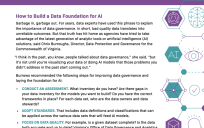Given tight budgets in the wake of the coronavirus pandemic, the question of whether governments can afford to invest in advanced data analytics is entirely reasonable. The real question, though, is whether they can afford not to.
Research at Harvard’s Kennedy School of Government has found that applying data analytics to the problems of governmental waste, fraud and abuse can yield returns as high as 10 to 15 times their cost. McKinsey & Co. analysts have estimated that 20% of global government revenues go missing each year either through not being paid properly or governments themselves overpaying – a trillion-dollar gap. Such massive gains can be had, and massive losses avoided, through:
- Detecting fraud
- Improving efficiency
- Boosting revenue (through, say, improved tax compliance and collection)
- Saving on labor
- Enhancing safety
- Catching social service and other problems early, among other areas
These gains extend beyond the financial. “There is significant non-financial benefit as well, as public faith and government may improve when saving time and money is paired with increased transparency and accountability,” the Harvard study says.
Another challenge is that advanced data analytics – the combining of mass amounts of data from diverse sources, machine learning, and visualization to provide actionable insights – can mean many different things in practice.
With money from the American Rescue Plan Act of 2021 (ARPA) already flowing and the prospect of billions more dollars from the federal infrastructure bill now being negotiated on Capitol Hill, intelligent spend management is something governments should seriously be considering.
This type of data analytics can provide a deep, dispassionate basis for evaluating alternative capital and other investments. That yields better insights into the costs and benefits of potential projects and enables more in-depth comparisons of various options. Politics and perceived need will still drive the ultimate investment decisions, but the usual horse-trading can proceed with a better understanding of the value of the various horses.
Once investment and spending decisions are made, data analytics enable unprecedented budgetary transparency and accountability and, by extension, can do much to enhance trust in government. That includes avoiding public relations disasters and public ire in the wake of surprise evidence that that trust has been breached. This, too, is already happening.
Government Use Cases
Indiana’s Management Performance Hub’s Transparency Portal leverages data analytics and visualization tools to deliver detailed data on vendors, expenditures, revenues and assets to state leaders, personnel, government watchdogs, and others to help improve how Indiana spends its taxpayer dollars.
Pennsylvania is using advanced data analytics to act on insights distilled from troves of data from all corners of the commonwealth. Among other uses, they’re taking myriad financial transactions, grants, contracts, and other siloed information and creating holistic views of spending by type of spend, agency, vendor and so on. That same system is serving up candidates for internal audits based on hard data – rather than the old way based on manual, subjective processes.
Advanced data analytics are also more than earning their keep in areas one might not expect. Indiana is using it to determine where to locate new opioid treatment centers and more strategically distribute the overdose drug naloxone. The New South Wales Rural Fire Service, the world’s largest volunteer firefighting organization, uses intelligent workforce management driven by advanced data analytics to understand what volunteers have what skills and in what mix to deploy them. That plus other functions save the Service 20,000 person-hours each fire season. Its 76,000 volunteers and 1,000 staff dealt with 26,000 fires in an area the size of Texas plus Virginia during the 2019-2020 fire season.
Social service organizations have used advanced data analytics to look across a spectrum of data sets – 911 calls, citizen requests for services, tax records, and others – to flag risk cases before they grow into full-blown health or law enforcement crises.
I could cite further examples from human resources to public transportation to mail delivery. But let’s be honest: Despite the dramatic success stories that I and the Kennedy School, McKinsey, and so many others in this business have observed, there are still far too few of them out there. Perhaps the pressing need to wisely apply and closely monitor the infrastructure spending set to blossom as we emerge from this pandemic will change that.
Martin Klein is the Global General Manager Public Services at SAP, based in Walldorf, Germany. He is responsible for SAP´s end-to-end footprint in the Public Services Industries including Public Sector, Defense & Security, Postal Services, Future Cities.





Leave a Reply
You must be logged in to post a comment.